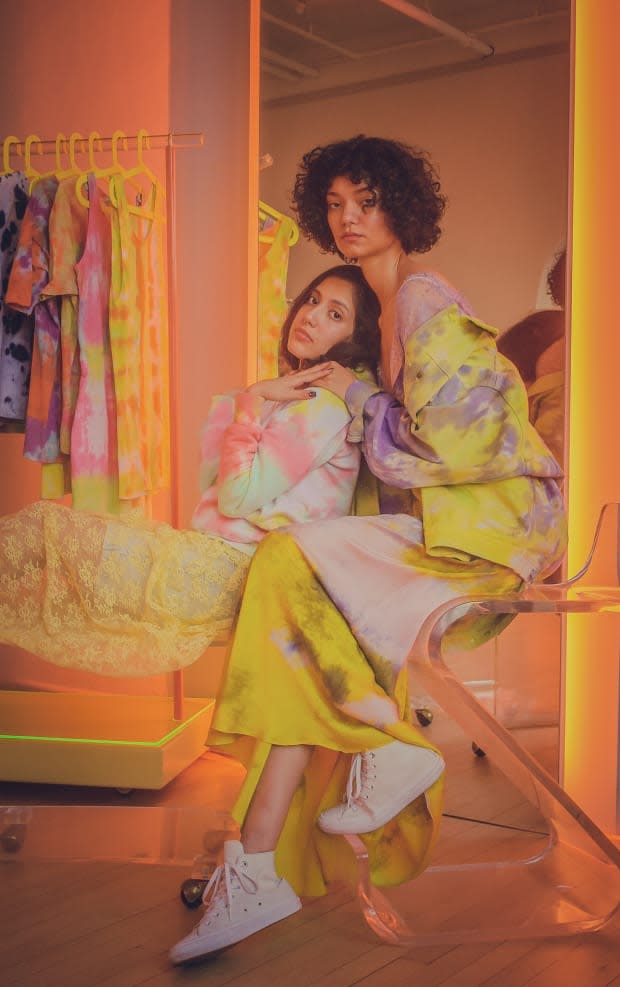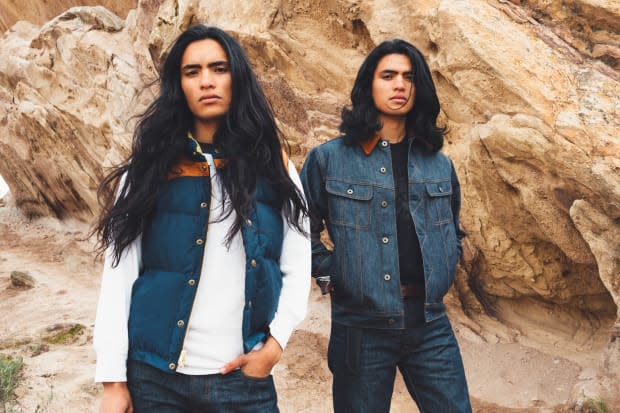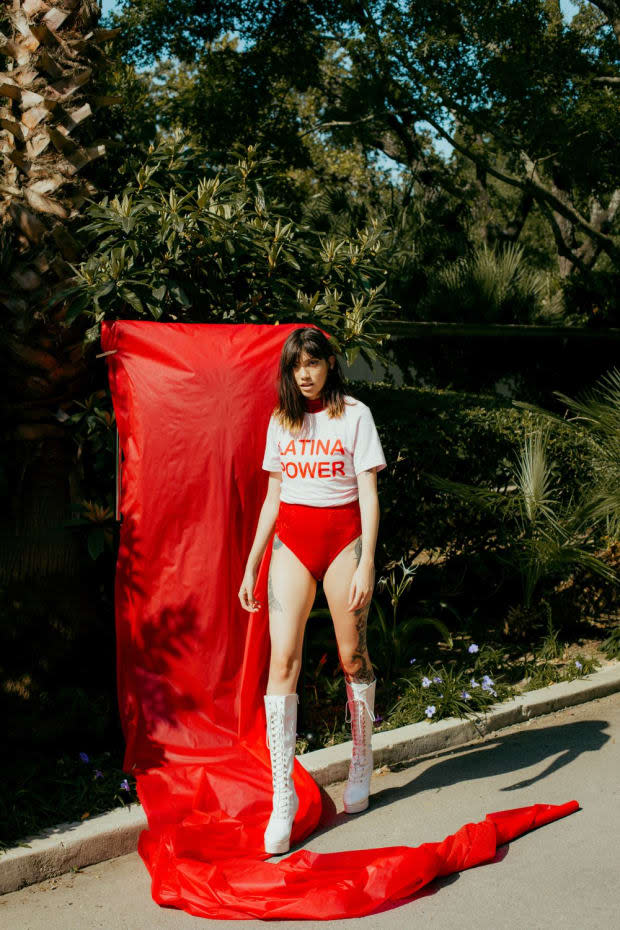Founding a Small Brand Outside a Fashion Capital Can Be Good for Business
Cities like Portland, Philadelphia and Brownsville may lack in established fashion infrastructure, but they make up for it in community and authentically unique inspiration.

Shelly Horst and Dryw Scully might be living an American dream in South Philly. The couple behind Room Shop Vintage, makers of those bodacious organza scrunchies, opened a showroom in a renovated former vocational school known as the Bok building. They also live one block from their showroom, which means avoiding a morning commute stuck in traffic or sandwiched coat-to-coat on a train.
Moving from Brooklyn to Philadelphia was "such a relief in so many ways because I wasn't constantly having to protect my energy on the subway platform," Horst says. She and her husband, a life-long Philly resident, left their corporate retail jobs and took a road trip across the US, thrifting and collecting vintage pieces along the way. A few successful pop-up vintage sales later — along with selling on Instagram — and Room Shop was born.
It feels dated at this point to suggest that a designer is in an unusual position by not being located in a city like New York or LA. The fashion-week infrastructure matters less and less, and with the democratizing effect of Instagram, if your brand hits, it hits.
"Instagram is my love language," Jen Zeano of Jen Zeano Designs, another brand based outside the recognized fashion capitals, says.
Her "Latina Power" shirt, created in 2016 as a response to the presidential election, has been shared on Instagram by Gina Rodriguez from "Jane the Virgin" and Aimee Carrero, the voice of Princess Elena on "Elena of Avalor." This buzz, along with being selected as one of 10 Latina entrepreneurs for the #WeAllGrow conference, propelled Zeano's business.
Related Articles
What Small Brands Can Learn From the Barneys New York Bankruptcy
Do We Really Need Any More Sustainable Fashion Brands?
Why Womenswear Brands Are Getting Into Menswear — and Whether It's a Good Thing
Born in Matamoros, a Mexican border city, she grew up right across the bridge in the South Texas town of Brownsville. Though she travels frequently about five hours north to Austin for pop-up shops, she can't envision leaving her home in the Rio Grande Valley. Aside from being an only child who doesn't want to be far from her parents, her brand wouldn't be her brand without the inspiration of this border area where over 90% of residents are Latinx.
"I don't want to leave the authentic food, the culture, the Posadas around the holidays. I feel like I'm able to create this brand so well from here," Zeano says. "I'm so connected to my culture and my roots here that I don't see myself wanting to leave anytime."
Portland-based, workwear-inspired clothing line Ginew was born from a wedding, a trip to Marfa and a stranger offering $200 for Erik Brodt's handmade buffalo belt. Brodt and his wife Amanda Bruegl co-founded the brand that's currently the only Native American-owned denim collection. Ginew comes from Brodt's Ojibwe name, and Bruegl is Oneida and Stockbridge-Munsee.
After getting married in 2010, the couple gave wedding party members belts made from the hide of a buffalo Brodt's dad had shot. When they moved to Texas, Brodt began learning more about leatherwork as Bruegl attended school. Both Bruegel and Brodt are full-time doctors in addition to running their brand.
A caffeinated morning spent at Marfa's El Cosmico catalyzed the couple into designing apparel when Brodt started imagining what his great-great-grandfather would have worn when he transitioned from a sort of hunter-gatherer lifestyle into a more agrarian existence.
Upon moving to Portland in 2015, they describe being instantly welcomed instead of having to elbow their way into a new community. "It's unlike any place we've lived or been before," Brodt says.

A coffee-shop manager friend who shapes surfboards gifted the couple a board he had glassed with a Ginew blanket pattern. There's also Dehen 1920, the century-old, family-owned company that supported Bruegl and Brodt when they arrived in Portland.
"They've really taken us under their wing to make sure that we exist and continue to exist in this space," Brodt says. These are some of the examples he uses when talking about the city's specialness. "Really the magic of Portland and the magic of our experience here, it all comes down to people," he says.
He also credits the Oregon Native American Chamber of Commerce (ONAC) for bolstering Ginew's presence in Portland and connecting them to a community of Native American businesses, large and small. ONAC is a business incubator created to support educational and economic opportunities for Native Americans in Oregon and Southwest Washington.
"There are a lot of different tribes here, civic leaders, there's a lot of engagement with the tribal communities," he says.
For Zeano, a local organization fostering economic development for Brownsville's small businesses has also been a boon for her company, helping her during the scalability phase she's currently in. She also connected with a mentor at a women's business center who's been there for her as she navigates being a new-ish small business owner.
"Those are the two things for me," Zeano says of the benefits to living in her South Texas city. "Finding the help that we need and being surrounded by the thing that makes our brand what it is."
Business incubators and mentors are, of course, available in New York and LA, but the one-on-one attention and tight-knit community might not be found in quite the same way. All three brands share a similar quality of elevated style — looks that could do well anywhere — and yet they feel inextricably connected to the cities where they live.
For Philly-based Room Shop, it's Philadelphia's Fabric Row, an area with historic, family-owned textiles businesses, that supplies inspiration, generations of acumen and deadstock fabric for the couple's sustainable pieces. For Ginew it's Portland sunsets ("the colors are quite unlike anything I've seen before," Brodt says) and the possibility of encountering a bear sitting in the middle of the road, as the brand founders did recently, that infuse the label's color palettes and designs.
Logistical challenges that could be faced by being located further from fashion capitals seem to be the sorts of challenges any young brand might encounter, whether it's the unrealistic shipping expectations that Amazon has created or finding the right manufacturers.

"We're currently in the scaling process and trying to become more of a well-rounded lifestyle brand with different kinds of products," Zeano says. "Finding those manufacturers has definitely been a challenge just because we're not LA, where you can go downtown and there are streets and streets of manufacturers."
But she also mentions the unique ports of entry available to her brand by being located in a border region. Similarly, for Room Shop, Horst says that while it's easier to find factories in LA, the prices are much higher.
"We're able to still make things in Philly, in the US, but [we can actually] afford to make them here," she says.
For her, an unexpected benefit of being located outside New York or LA was having to develop a salient brand identity.
"I think if we lived in New York, we would definitely have more exposure," she says. "We've had to work harder at that, but I think in a good way. It's made our point of view and perspective and brand identity very clear."
All three brands foresee being located in their respective home cities for the long run. Brodt described a setting during a photoshoot where five languages were spoken and everybody, from stylist's assistant to model, was Indigenous. It was not only a physical embodiment of Ginew's goal to increase the visibility of Indigenous people in the fashion world, but it was also a reminder of why Portland is an ideal city for the couple.
"It's a way to look at our community, recognize the expertise and the talent that is here, and to press on from the excuses that everybody's gonna give like, 'Oh, we would love to hire a Native American photographer, but they just don't exist at the talent level we need,'" Brodt says. "It's like, 'Well, actually, this photographer's done a bunch of stuff with Nike.'"
